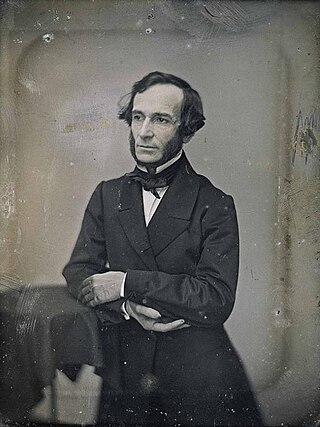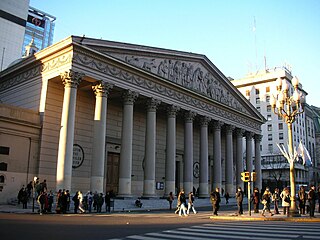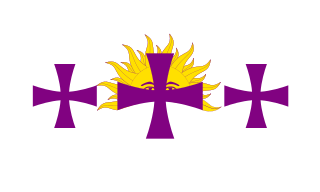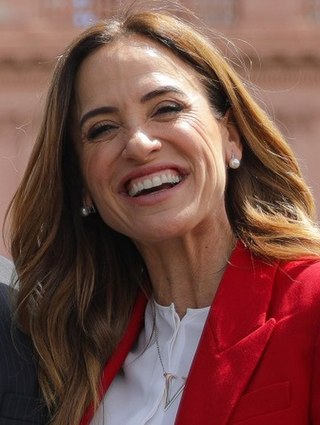
The Argentine Confederation was the last predecessor state of modern Argentina; its name is still one of the official names of the country according to the Argentine Constitution, Article 35. It was the name of the country from 1831 to 1852, when the provinces were organized as a confederation without a head of state. The governor of Buenos Aires Province managed foreign relations during this time. Under his rule, the Argentine Confederation resisted attacks by Brazil, Bolivia, Uruguay, France and the United Kingdom, as well as other Argentine factions during the Argentine Civil Wars.

Juan Manuel José Domingo Ortiz de Rosas, nicknamed "Restorer of the Laws", was an Argentine politician and army officer who ruled Buenos Aires Province and briefly the Argentine Confederation. Although born into a wealthy family, Rosas independently amassed a personal fortune, acquiring large tracts of land in the process. Rosas enlisted his workers in a private militia, as was common for rural proprietors, and took part in the disputes that led to numerous civil wars in his country. Victorious in warfare, personally influential, and with vast landholdings and a loyal private army, Rosas became a caudillo, as provincial warlords in the region were known. He eventually reached the rank of brigadier general, the highest in the Argentine Army, and became the undisputed leader of the Federalist Party.

Juan Bautista Alberdi was an Argentine political theorist and diplomat. Although he lived most of his life in exile in Montevideo, Uruguay and in Chile, he influenced the content of the Constitution of Argentina of 1853.

Lieutenant General José Félix Benito Uriburu y Uriburu was the President of the Provisional Government of Argentina, ousting the successor to President Hipólito Yrigoyen by means of a military coup and declaring himself president. From 6 September 1930 to 20 February 1932, he controlled both the Executive and Legislative branches of government. As "President of the Provisional Government," he acted as the de facto Head of state of Argentina. His was the first of a series of successful coups d'état and unconstitutional governments that came to power in 1943, 1955, 1962, 1966, and 1976.

The Battle of Caseros was a military engagement fought near the town of El Palomar, Buenos Aires Province, Argentina, on 3 February 1852, between the Army of Buenos Aires commanded by Juan Manuel de Rosas and the Grand Army led by Justo José de Urquiza. The forces of Urquiza, caudillo and governor of Entre Ríos, defeated Rosas, who fled to the United Kingdom. This defeat marked a sharp division in the history of Argentina. As provisional Director of the Argentine Confederation, Urquiza sponsored the creation of the Constitution in 1853, and became the first constitutional President of Argentina in 1854.

The following is an alphabetical list of topics related to the Argentina.

Gaucho literature, also known as gauchesco ("gauchoesque") genre was a literary movement purporting to use the language of the gauchos, comparable to the American cowboy, and reflecting their mentality. Although earlier works have been identified as gauchoesque, the movement particularly thrived from the 1870s to 1920s in Argentina, Uruguay and southern Brazil after which the movement petered out, although some works continued to be written. Gauchoesque works continue to be read and studied as a significant part of Argentine literary history.

The Metropolitan Archdiocese of Buenos Aires is a Latin Church ecclesiastical territory or archdiocese of the Catholic Church in Argentina. It is a metropolitan archdiocese with 13 suffragan sees in the country, including two Eastern Catholic eparchies.

Hispanidad is a Spanish term alluding to the group of people, countries, and communities that share the Spanish language and Hispanic culture. The term can have various, different implications and meanings depending on country of origin, socio-political views, and cultural background.

The Movimiento Nacionalista Tacuara was an Argentine far right orthodox peronist and fascist movement from 1955 through the 1960s, which later integrated Juan Perón's right-wing "Special Formations". Linked to the more radical sectors of the Peronist movement, and directly inspired by Julio Meinvielle's Catholic pronouncements, Tacuara defended nationalist, Catholic, anti-liberal, anti-communist, antisemitic and anti-democratic ideas, and had as its first model the Spaniard Primo de Rivera's fascist Falange. In the years 1960–66, the movement incorporated Neo Nazi elements. Its main leaders were Alberto Ezcurra Uriburu, José Luis "Joe" Baxter, Oscar Denovi, and Eduardo Rosa. Various ideologically contradictory movements emerged from this group. After three important splits in the early 1960s, the police cracked down on most factions in March 1964. A year later, the entire MNT was outlawed by President Arturo Illia (UCR). Composed of young people from right-wing backgrounds, it has been called the "first urban guerrilla group in Argentina".

Manuel Espinosa was an Argentinian painter.
Andrés Manuel Carretero (1927–2004) was an Argentine essayist and self-taught historian. He was born in Bragado and died on July 10, 2004.
The Argentine Constitutional Reforms of 1949 were approved during Juan Domingo Perón's government. This new constitution was a major revision of the Constitution of Argentina. Its goal was to modernize and adapt the text to the twentieth century's concepts of democracy, with a bill of social rights, including better working conditions for the working class, right to education, etc. It also allowed for the indefinite reelection of the president.

Argentine nationalism refers to the nationalism of Argentine people and Argentine culture. It surged during the War of Independence and the Civil Wars, and strengthened during the 1880s.
The Battle of Rodeo del Medio, fought in Mendoza Province, Argentina on 24 September 1841, was a battle between the Federalist army of Ángel Pacheco and the Unitarian army of Gregorio Aráoz de Lamadrid during the Argentine Civil Wars. The consequences of the Federalist victory would last for a decade.
Juan José Canaveris (1780–1837) was an Argentine jurist and politician, who served as military man, lawyer, notary, prosecutor and accountant of Buenos Aires. In 1809 he was honored by the Junta Suprema de Sevilla, for his heroic participation in the defense of Buenos Aires, during the English invasions in the Río de la Plata.

León Ortiz de Rozas was a Spanish military and politician, who had an active participation during the colonial and post colonial period of Argentina. He served as Commander in the military expeditions against the Indians during the Viceroyalty of the Río de la Plata.
Juan Manuel Canaveris (1804-1868) was an Argentine jurist and politician, who served in Buenos Aires and Montevideo as attorney, teacher and military man. He participated of the escort of honor in the funerals of Manuel Dorrego, and collaborated in the early days of government of Juan Manuel de Rosas.

Batallón de Voluntarios Rebajados de Buenos Aires was a 19th-century Argentine military unit formed mainly with veterans of the Brazilian War and the expeditionaries to the Desert of 1833 and 1834. It was a special unit of the Federal Party of active participation during the civil war between federales and unitarios.

Victoria Tolosa Paz is an Argentine politician and public accountant. Since 2022, she has been Minister of Social Development in the cabinet of President Alberto Fernández.















